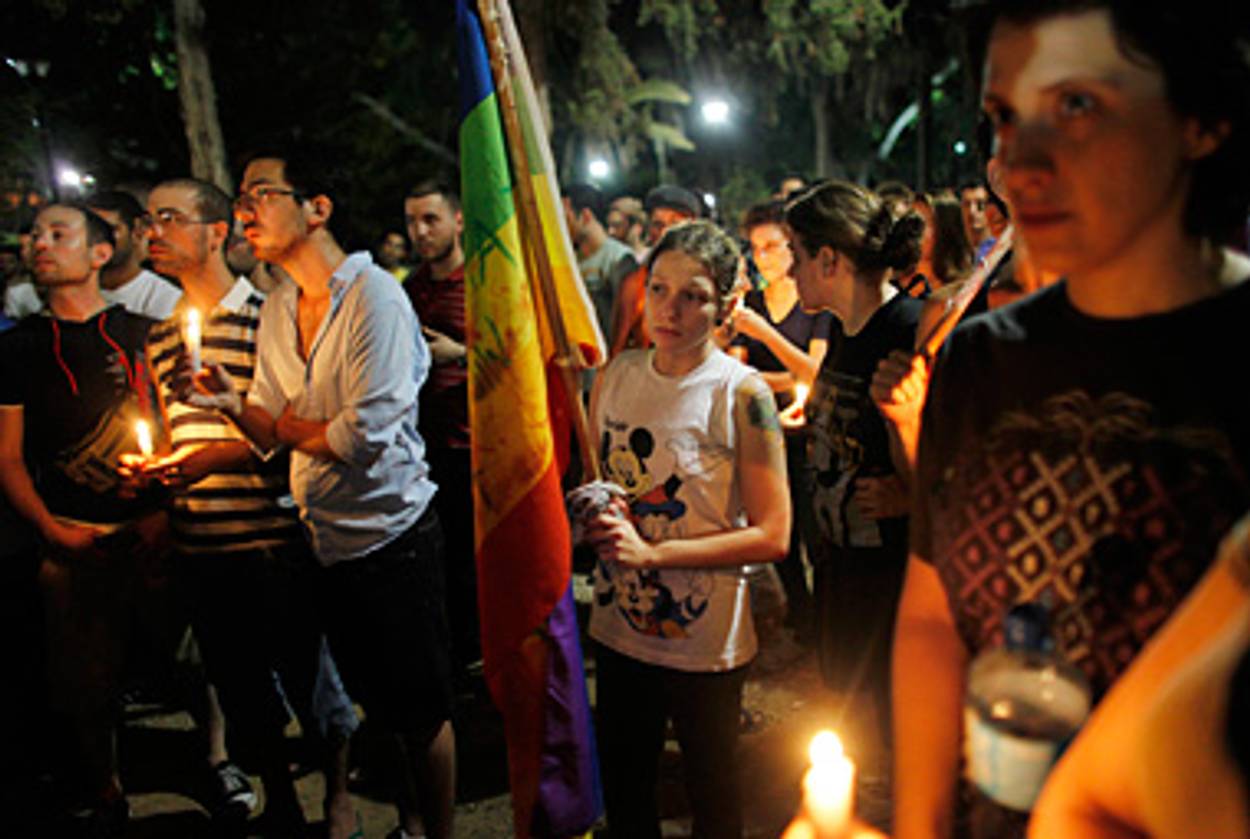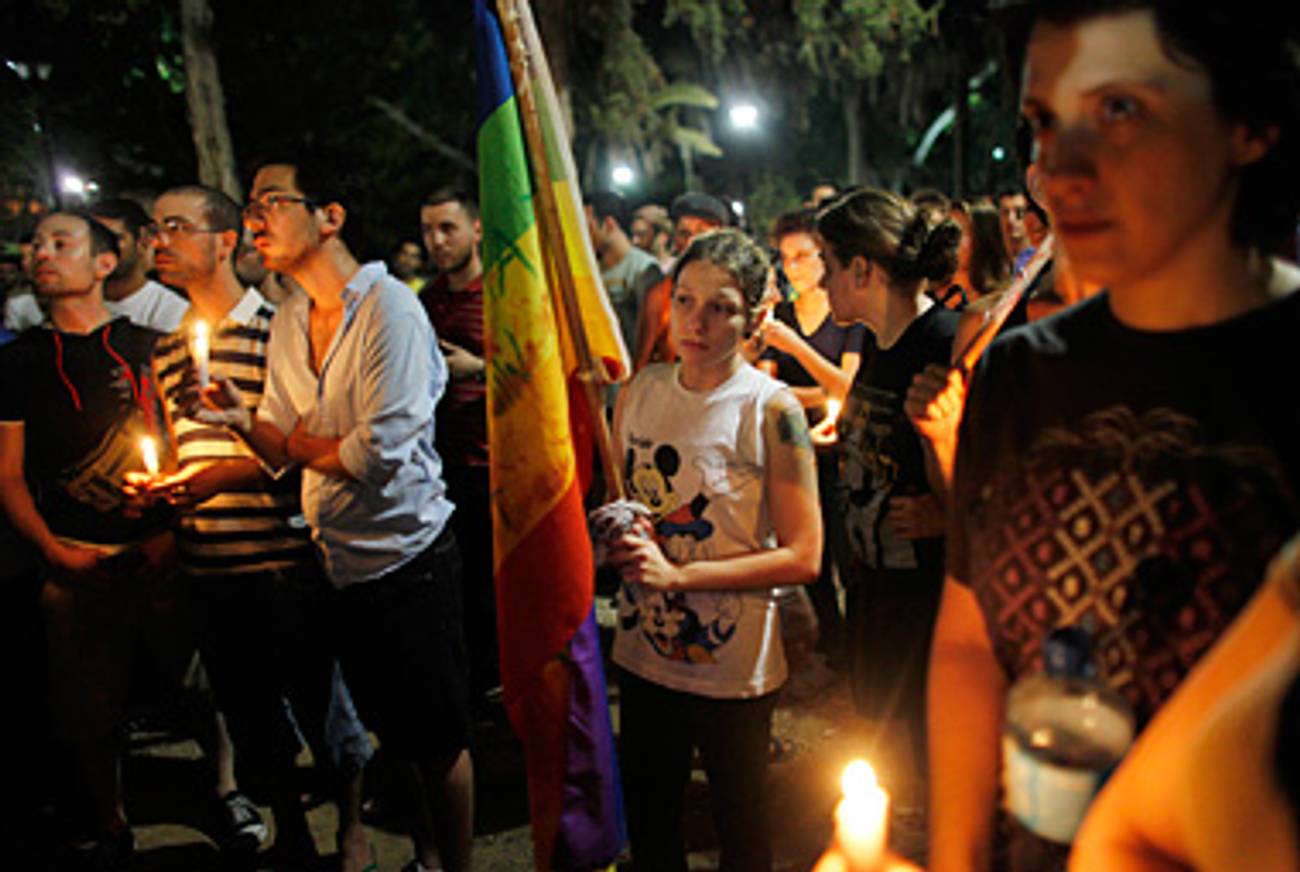A Bubble No More
Does the gay-center shooting spell the end of Tel Aviv as utopia?




It was Saturday morning, and my girlfriend and I woke up in Tel Aviv. I’m here for a month from London, engaged in an ongoing flirtation with the place where I think I want to live. Poppy is here for a week, skeptical, but with an avowedly open mind. All week I have been propagandizing her about the city. Schlepping her hither and thither, wheeling her into cafes and out again, waiting, and hoping for the love to take hold. Look! The world’s first secular Jewish city! 100 years old! I listen to myself and realize I sound like some kind of publicity instrument of the municipality. But it’s genuine, I feel it—that beauty flowers everywhere here. I want her to feel it herself, that thing, whatever it is. Not Zionism, necessarily. But Tel Aviv-ism. It’s a bubble, she says. How can people live like this, not engaging? What she sees is a city of consumers—dancing, eating, hooking up, ignoring. I see that too, but feel happy: to me it’s just a city of people living their lives.
We were supposed to wake up at 6 a.m. and travel to Ramallah. That was almost a condition of Poppy coming here: to see the other side. But we slept in, didn’t make it to Jerusalem, and missed the organized tour I had booked. I was relieved, I admit. I can—and do—engage with ‘Israel the occupier’ from London—there’s no other option. Here, I just want to live for one month—as a young, gay, Jewish woman, far from the sense of otherness that I grew up with. I didn’t want to go to Ramallah. I didn’t want to be pushed out of the bubble. Being in the bubble is what I came here for.
Instead, we spent the day cycling around the city, drinking coffee in the hip southern neighborhood of Florentine and in Jaffa, playing matkot on the beach, going for sushi. The plan was either to meet some Israeli friends later in a gay bar, or to go to a “queer party.” There’s always something going on in Tel Aviv, but gay life has become so much a part of the city’s cultural fabric that it doesn’t feel like going out “on the scene.” The whole city is the “scene.”
In the end, we decided to just walk home. As usual, I was trying to find the most scenic route—we walked up Montefiore Street, then onto Ahad Ha’am, a quiet, shady street dotted with some of the city’s most beautiful Bauhaus buildings. Then at Nachmani Street, we stumbled into a crowd—of gawkers, of journalists, of ambulances.
By now, we all know what happened. Someone came into a gay community center, shot indiscriminately around the basement where a group of teenagers was meeting, and then walked out. Two people are dead: Nir Katz, a 26-year-old man who volunteered at the center, and Liz Trobishi, a 16-year-old girl. Trobishi’s aunt commented in Haaretz that she was “a passing visitor” who had “no connection to that place.” More people were injured, some seriously. The shooter is still on the loose.
I called a friend to tell her what had happened, but she already knew—police had closed all the gay bars, cafés and clubs in Tel Aviv. She was trapped in the bar where we had planned to meet her, not allowed to leave in case the attacker pressed on to other locations around the city. When they were released, they came to Nachmani Street, where an impromptu vigil took place.
It was a tragic bookend to a week that began with Poppy and I meeting Haggai Agmon-Snir, of the Jerusalem Inter-Cultural Centre, who told us that his organization had spent a year mediating negotiations between gay community leaders and ultra-Orthodox leaders, to allow World Pride Day to take place in Jerusalem. The negotiations were successful—the day happened. But that’s Jerusalem. Of course it was tricky. But here? In Tel Aviv? How could something like this happen in Tel Aviv?
The next day, the city felt like a changed place. Thousands gathered at a solidarity rally that evening on Rothschild, the café-lined boulevard that runs through the heart of the city—most people’s favorite street in Tel Aviv. No one seemed afraid—not of being shot, anyway. Still, a boldness was gone, the boldness I had experienced earlier in my visit, the boldness of the Pride Parade in Tel Aviv in June. People had recycled their Pride banners and were holding them aloft, but the atmosphere couldn’t have been more different to the exuberant one of a few months earlier, when over 10,000 people set out to march from Rabin Square.
I was taking pictures of the crowd. A girl asked me if I had photographed her girlfriend who was in the army and “not allowed to be there.” I said I didn’t think so. I let her check my photos. We looked at each other. I could tell she was ashamed at having asked. And I felt guilty for having made someone feel more vulnerable than they already felt.
Speakers spoke—politicians, activists, lawmakers—and people cheered. The biggest cheer of the day rose up in response to a comment by a community activist. I asked someone next to me to translate. She said that a country that allows the blood of Palestinians to flow should expect something like this to happen. I thought about our Ramallah trip that never happened, and wanted to talk to Poppy, but I couldn’t. She was already on the plane home.
After the rally, I sat in a café and watched people disperse. Next to me was a French news crew. I listened to the French journalist doing his piece to camera. He was talking of Tel Aviv as the youthful center of Israel, the most free, the most liberal place in the Middle East. All the news I hear at home about Israel has a single narrative—the victim turned victimizer. Today’s was a different narrative—a loss of innocence. It was even the top story on the BBC website for a while, before being replaced by reports of Palestinian homes being raided in East Jerusalem.
The bubble has burst. Of course it has. This attack could have happened anywhere—I remember when a nail bomber hit London’s Soho in 1999, killing two and injuring scores of others. But it didn’t. It happened here.
Meanwhile, as I do what Diaspora Jews do—ruminate on their relationship with Israel—two families buried their children. Whoever is responsible still hasn’t been found, and people are starting to talk about what it could mean for life in the city if that person is never found.
On Saturday, as a huge rally takes place in Rabin Square, I will be flying back to London, the end of my month here. When I get back, I think I can have a better, more productive, more honest conversation with Poppy about the possibility of living or spending more time here. I can’t engage with Tel Aviv as a curative to my own experience, growing up gay in a small homogeneous Jewish community, or as an antidote to the tide of anti-Israel feeling I find so difficult in London. I think a lot of Diaspora Jews treat Israel as a kind of playground, willfully naïve. I hadn’t realized that I was one of them.
Nicole Taylor is a screenwriter based in London.
Nicole Taylor is a screenwriter based in London.